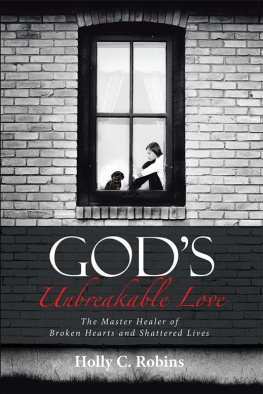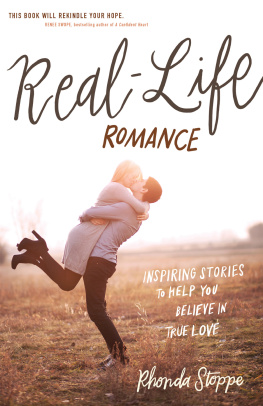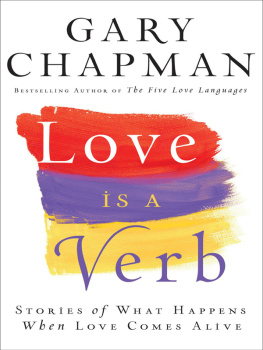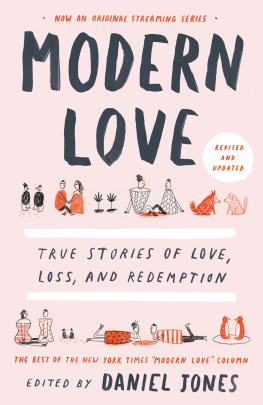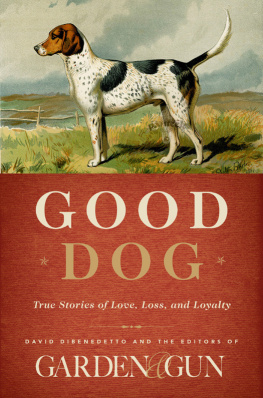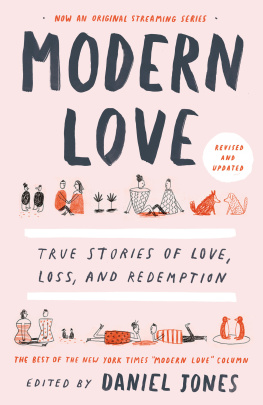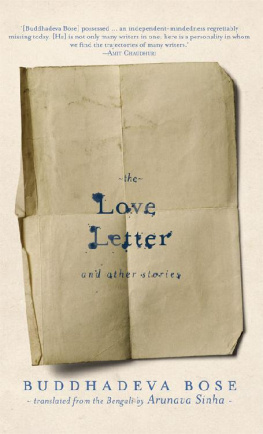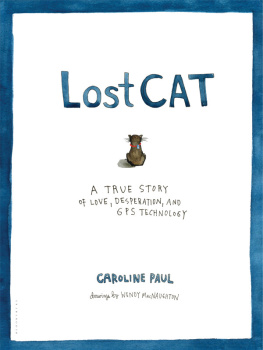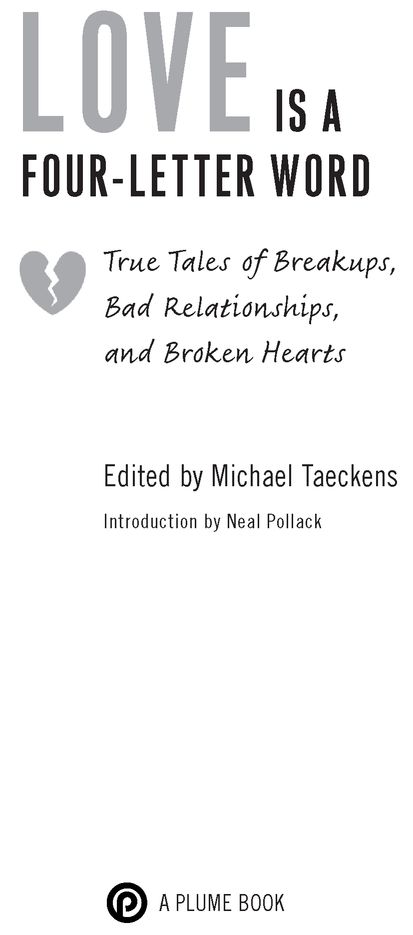Table of Contents
A PLUME BOOK
LOVE IS A FOUR-LETTER WORD
MICHAEL TAECKENS received his MFA from the Iowa Writers Workshop. He lives in Durham, North Carolina.
These dispatches from the deep dark depths of romantic doom will make you cringe, laugh, wince, sigh, laugh again, nod along in Ive-been-there empathy, and recoil in thank-Jesus-I-never-went- there chagrin. Heres the end of love, or what sometimes passes for it, in all its many forms: wistful, bitter, confused, tender, regret strewn, and sometimes freakin deranged.
Jonathan Miles, author of Dear American Airlines
The song says breaking up is hard to do, but the superb writers in Love Is a Four-Letter Word say heartbreak is just a little more complex. These hilarious, poignant, and insightful stories trace the oft-inescapable journey from loves bliss to its brutal undoing and somehow, miraculously, back again. Read these tales to be moved, surprised, healed, and, most of all, transported from the wreck of your own heart.
Jennifer Gilmore, author of Golden Country
It is a truth universally acknowledged that anyone who has ever ventured into a relationship has a messy breakup story to tell, and this anthology throbs with tales of heartbreak and woe by the best and brightest of todays literary scene. In these deft, funny, and honest tales youre apt to recognize yourself on the giving end, on the receiving end and, God help you, on both ends.
Mark Sarvas, author of Harry, Revised
If I were able to write about my ex-girlfriends with this level of wit, passion, and insight, I probably would have a lot fewer of them!
Kevin Smokler, author of Bookmark Now:
Writing in Unreaderly Times
Love is laid bare in these absolutely human stories, and in so many different ways that I understood more about myself than I could have ever entertained. Love Is a Four-Letter Word is an exquisite glimpse into the heart, into romance, into love. These words hurt and shine as much as the tales many landscapes, and I am left with a less-broken heart for having read them.
Brad Land, author of Goat: A Memoir and
Pilgrims Upon the Earth
An alluringly voyeuristic collection of romantic cautionary tales, without the predictable happily ever after endingsat least fifty new ways to leave your lover.
Amy Fine Collins, author of The God of Driving
For T. A. S.
Acknowledgments
Thank you to:
Doug Stewart, my agent, for believing in this project from the outset; Signe Pike, for her enthusiasm and expert editorial eye; Nadia Kashper, Alexandra Ramstrum, Cristi Hall, and everyone else at Plume who has made this such a wonderful experience; David Cashion, for first seeing promise in this book.
All of the fine contributorsI feel humbled to be in your company.
Wendy McClure, for twenty amazing years of friendship and for being the first to say yes to contributing to this anthology. Her talent and wicked sense of humor never cease to amaze me.
Chuck Adams, whose sagacity, encouragement, and friendship meant everything.
Wendy Brenner, whose all-around awesomeness makes me feel blessed just to know her.
Pamela Strauss, a significant friend in every way, who said exactly the right thing to get me started on this book; and Patty Van Norman, dear friend and contributor, who is not fat and ugly and dumb, but thin and pretty and smart.
Michelle Green, Maud Newton, and Amanda Stern, for their advice, suggestions, and overall support.
All of the great people at Algonquin and Workman, past and present, who I feel very fortunate to know and work with.
And to Patty Berg, Nicki Clendening, Katie Courtland, Diane Daniel, Marianne Drysdale, Amy Forstadt, Antonia Fusco, Re becca Gimenez, Shelly Goodin, Carla Gray, Kim Hicks, Lou Jobst, Geoff Kessell, Kevin Kopelson, Lance Luckow, Mark Lazenby, Mickey Madden, Kristin Matthews, Sue Meyer, Beth and Javier Parada, Shannon Ravenel, Aimee Rodriguez, Leslie Rossman, Thomas Sherratt, Kim Small, Bruce Staska, Jenny, Jon, and Sterling Whaley, and Jesse Wilbur.
The heart was made to be broken.
Oscar Wilde
Introduction
Neal Pollack
Romance is a dangerous distraction, and its shoals have wrecked many a life. Writers, being romantic and often foolishly so, know this better than anyone; stories of ruined or impossible love have been around since the dawn of storytelling and will endure until humanity (and, by association, dating) ends. The light of the cautionary tale may not penetrate the fog of destructive love, but at least its there for us to read when were surveying the wreckage. Literature, or at least good literature, teaches us that romance is a hopeless, sad waste of time.
Take Chekhovs protagonist in The Lady with the Dog. Upon seeing his twice-met love at the theater, this goes through his mind: He understood clearly that for him there was in the whole world no creature so near, so precious, and so important to him; she, this little woman, in no way remarkable, lost in a provincial crowd, with a vulgar lorgnette in her hand, filled his whole life now, was his sorrow and his joy, the one happiness that he now desired for himself, and to the sounds of the inferior orchestra, of the wretched provincial violins, he thought how lovely she was. He thought and dreamed. Though the story doesnt end with a breakup, per se, it does end with the protagonist clutching his hair in his hands and moaning, How? How? How?
Hey, pal, weve all been there, and many of us have written about it.
Those of you who have been left sobbing on a subway platform, or have suffered the indignity of sitting in a bar waiting for a love who wont ever arrive, would have done well to remember your forebears. Romeo and Juliet may be an overly referenced, obvious, or extreme example, but its endured for a reason. Minus the swordplay, its themes of heartbreak and sexual frustration would be plenty at home in a Nerve cover story. Goethes Werther kills himself because of unrequited sexual passion. Frdric Moreau, the protagonist of Flauberts Sentimental Education, spends an entire revolution pining desperately after a married older woman (while quoting Goethe), only to conclude, later in life, that his one true passion is, in fact, a pretty ordinary woman. My point is, all this might make getting dumped over e-mail look like a good day.
Then again, it may be just a little unfair to compare the contemporary torrent of nonfiction relationship writing to the best work of the greatest novelist of all time. What if Flaubert had to resort to hackery of our specific kind? Imagine if, hard up for cash, hed written a true-life essay version of Madame Bovary: I was a good-for-nothing layabout. She was a bored provincial housewife with misguided notions about romantic love. It couldnt end well.
Alternately, I could see F. Scott Fitzgerald doing this kind of work: Sometimes, Zelda and I think we should stop drinking.
In our era of optionable true-life tales, of incessantly candid blogging and downtown reading series, the relationship essay seems to have become a self-sustaining genre. To say that I speak from experience somewhat diminishes people who have


